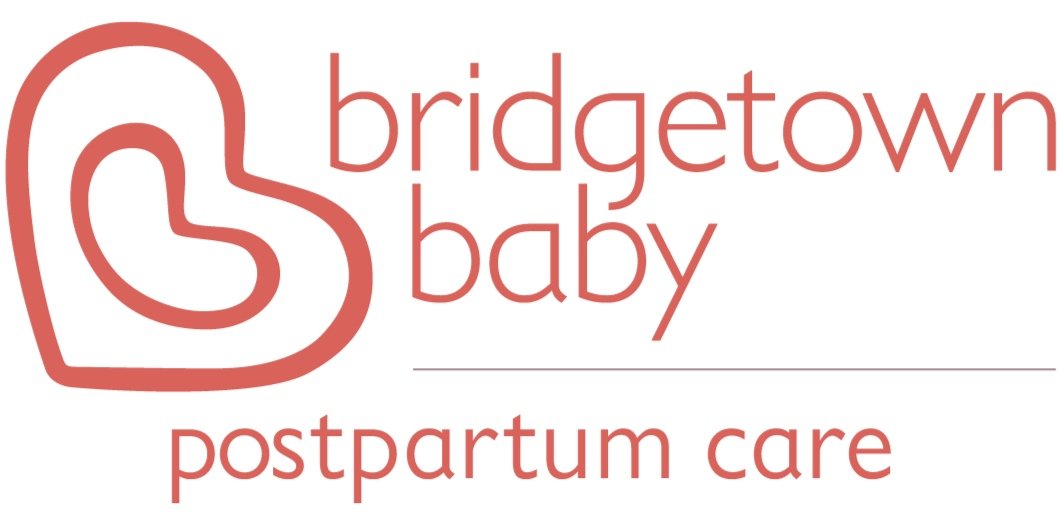Introducing Solids: A Quick-Start Guide
by Sarah Longwell, IBCLC ~ Bridgetown Baby Lactation Services Director
Many parents feel a mixture of excitement and trepidation about starting solid foods with their infants. Aside from all the hopes and uncertainties about how your baby will react to the experience, there can be so many questions. This is one area where it seems official recommendations have changed a lot over time, and there will be plenty of other opinions in the mix, too. The truth is, there is some flexibility in this part of parenting, and it’s okay to make your choices based on your family’s unique situation. Here are some of the key things you should know before you get started.
When to start
The recommendation here is pretty clear. The CDC, AAP, and WHO all agree that babies can start complementary foods around 6 months of age, and not too much earlier than that. Before this point, human milk or formula are the only appropriate foods for babies. However, it’s very important to begin solid foods when baby is developmentally ready based on skills, and it’s totally normal for some babies to need more time even after they are 6 months old.
Signs of readiness for solids
Here are the most important signs to watch for in your baby to know that it is safe to start solid foods:
Sitting skills: baby should be able to sit upright with minimal assistance
Why? When baby can stay upright without slouching or slumping, it protects the airway and reduces choking risk.Oral skills: If your baby reflexively uses their tongue to push everything out of their mouth, this is a sign they need more time before starting solids.
Why? Baby needs to be able to use their lips, cheeks, tongue, and jaw in a coordinated way to bring food from the front of the mouth to the back of the throat. This tongue thrust reflex protects baby from choking and signals that baby isn’t ready to coordinate all these movements for safe swallowing yet.Interest in food: Some babies will develop interest in watching you eat and try to grab for your food long before they are actually ready to eat solids, but others will take longer to willingly accept foods besides milk.
Why? Aside from introducing your baby to foods, you are also introducing them to the culture and practice of family mealtimes. If your long-term goal is pleasant meals where you don’t have to micromanage what your child eats, avoid setting an expectation now that feedings and power struggles go together.
What are good first foods?
Whether you’re doing baby-led weaning, spoon-feeding, or a hybrid approach, you may be wondering what your baby should be eating.
Around 6 months, babies benefit from some added iron in their diet, which is the reason for the common recommendation of fortified baby cereals. Whole food iron sources such as pureed or soft cooked and mashed broccoli, oats, lentils, and leafy greens are also good options.
Other common first foods include bananas, avocados, pears, carrots, and green beans.
It’s a good idea to start early introducing your baby to the foods and flavors that are commonly included in your family meals.
Don’t worry about how much they are eating at first; nutritional bases are still covered by human milk and/or formula. Offer milk feeds before solids, and follow your baby’s lead about how much they want.
What about allergens?
For decades, the recommendation was to delay introduction of the most common allergens (peanuts and eggs) until after a child’s first birthday. In July of 2020, the US Department of Health and Human Services released new guidelines that suggest introducing these foods during the first year of life may be protective against developing allergies.
You should always discuss with your child’s provider whether their family history or other factors change the way you should approach introduction of solids, especially allergenic foods.
The new guidelines do not recommend introducing peanuts and eggs at 4 months of age. Instead, the recommendation is to avoid delaying allergen introduction once baby is ready for starting solids.
Once your baby has been exposed to these foods a few times with no sign of reaction, it is important to keep them in the regular meal rotation. The evidence suggests that regular exposure to eggs and peanuts over many months is important in preventing later allergies.
Safety considerations
If you haven’t taken an infant CPR and first aid class yet, or if you could use a refresher, consider doing that. Knowing what to do if your baby chokes will help you feel confident.
Remember there is a difference between gagging and choking! Gagging is a wonderful reflex that helps humans push food out of their mouths when they aren’t prepared to swallow it. This looks concerning, but stay calm- your baby’s nervous system is doing a good job! Choking occurs when the airway is blocked, and needs immediate attention. Here’s a good video showing normal gagging.
Avoid foods and textures that your baby isn’t ready for. Things that are hard, slippery, or round can be a particular problem while babies are learning.

